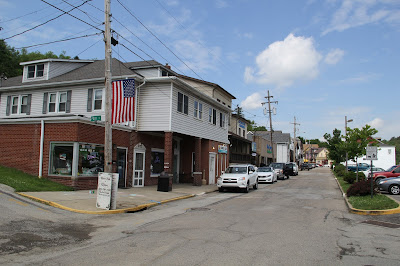Johnstown and the lives of thousands of people who lived there were destroyed in 1889 when a poorly-maintained earthen dam upstream on the Little Conemaugh River gave way and a wave of water, rocks, lumber and trees swept down the valley. The dam was owned by a club where wealthy people had summer houses--some of the same captains of industry who owned and ran the mills. The rich giveth and they taketh away.
This place has survived so much misfortune. Still, there's a lot of positive energy among the townspeople, a couple of great museums and a network of community pride institutions, and it's attempting to reinvent itself as an education and healthcare hub. That's working for Pittsburgh. Hopefully, it can work for Johnstown, too.
 |
| Downtown Johnstown and remains of Bethlehem Steel |

